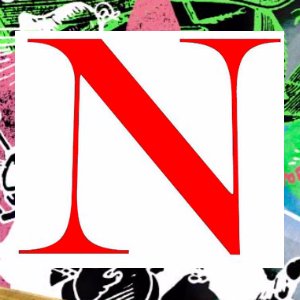
Books and the Arts
@BooksandtheArts
Followers
4K
Following
4K
Media
24
Statuses
5K
Books, music, ideas, film, and art criticism from The Nation's "back of the book" https://t.co/dgr3pv2Yp7…
New York, NY
Joined September 2016
.@heidegrrrrl on Ingeborg Bachmann, @mattduss on the Democrats' foreign policy, @LailaLalamion on the Internet's lost souls, Sarah Chihaya on the novels of Susan Choi, @rodriquese on James Baldwin's lives, @HeerJeet on William Buckley—Fall Books is here! https://t.co/o9mnpQs44S
0
7
18
@ZohranKMamdani @thomasbirm @simplylovia @NicholsUprising @KatrinaNation @typeinvestigate @BooksandtheArts @DavidAvromBell Nicholas Lemann on Osita Nwanevu's "The Right of the People." https://t.co/mbn3fWZyPl
thenation.com
Preserving our democracy is as urgent a task as ever, but the question is how.
0
2
0
Our December issue—and our third to have @ZohranKMamdani grace the cover—is here. This one has @thomasbirm with an investigation into Israel's big real estate mogul, @simplylovia on Luca Guadagnino’s new campus film, Jonathan Lethem on Franz Kafka and his dog, and so much more.
3
24
97
"Guadagnino’s films have always petitioned viewers to turn off their brains when it comes to love and sex." @simplylovia in the latest @BooksandtheArts on After the Hunt
thenation.com
Luca Guadagnino’s films have always asked viewers to turn off their brains when it comes to love and sex. In his new film, he asks the opposite.
0
5
7
@ZohranKMamdani @thomasbirm @simplylovia @NicholsUprising @KatrinaNation @typeinvestigate From @BooksandtheArts, @DavidAvromBell on Lynn Hunt's "The Revolutionary Self." https://t.co/I0zN7STw2Z
thenation.com
How did the idea of the individual come into being?
0
1
1
@ZohranKMamdani @thomasbirm @simplylovia @NicholsUprising @KatrinaNation @typeinvestigate @BooksandtheArts @DavidAvromBell And @simplylovia on Luca Guadagnino’s "After the Hunt." https://t.co/B44EtWA0JJ
thenation.com
Luca Guadagnino’s films have always asked viewers to turn off their brains when it comes to love and sex. In his new film, he asks the opposite.
1
1
5
.@simplylovia in @booksandthearts on Luca Guadagnino’s messy campus thriller After the Hunt. https://t.co/SwBJx5BYi4
thenation.com
Luca Guadagnino’s films have always asked viewers to turn off their brains when it comes to love and sex. In his new film, he asks the opposite.
0
1
5
Wrote about AFTER THE HUNT, a film of beautiful gowns and confusing intentions, for @thenation
https://t.co/sLSFFgHuGW
thenation.com
Luca Guadagnino’s films have always asked viewers to turn off their brains when it comes to love and sex. In his new film, he asks the opposite.
1
14
96
Jonathan Lethem in @BooksandtheArts on Franz Kafka and his dog
thenation.com
Kafka’s late story about a philosopher dog, like most of his stories about animals, is really about our lost humanity.
0
3
13
Why did Kafka always use animals to convey his human anxieties and uncertainties? Jonathan Lethem in @Booksandthearts on Franz Kafka and his animals. https://t.co/0rNAQOalRT
thenation.com
Kafka’s late story about a philosopher dog, like most of his stories about animals, is really about our lost humanity.
0
3
11
The idea of the modern self rests on a paradox: people "loudly protesting their individuality even as they are swept along by the passion of the crowd." @DavidAvromBell in @BooksandtheArts
thenation.com
How did the idea of the individual come into being?
0
21
58
My newest review, of Lynn Hunt's "The Revolutionary Self," in The Nation: https://t.co/wDncJMevf7
thenation.com
How did the idea of the individual come into being?
1
41
123
"Sentimental Value" is a kind of film we don’t see so often nowadays—honest art about adults and their feelings. https://t.co/skRVnqcSQy
thenation.com
In Sentimental Value, the Norwegian filmmaker’s most ambitious work yet, he examines the porous boundary between art and life.
1
5
16
Joachim Trier FALL! (wrote about his new movie) https://t.co/vLEdFaVZ4j
thenation.com
In Sentimental Value, the Norwegian filmmaker’s most ambitious work yet, he examines the porous boundary between art and life.
1
10
46
BIG NEWS! I’m launching a new weekend essay series @thenation. The Weekend Read will take the form of memoir, first-person narratives, and dispatches with a political through line. These pieces will come out every Saturday on our website and on The Nation’s Substack.
13
29
318
Gene Seymour in @booksandthearts on Chester Himes's genius as a detective novelist. https://t.co/Y1K6mkyuRi
thenation.com
Himes helped reinvent the idea of the detective novel. He also transformed it into a powerful vehicle for social criticism.
0
2
2
The Nation: “The proliferation of privately held companies during the Reagan years laid the foundations for Trump’s approach to government: rule by fiat and outside the scrutiny of the public.”:
thenation.com
The proliferation of privately held companies during the Reagan years laid the foundations for Trump’s approach to government.
1
8
19
Robin Blackburn in @BooksandtheArts on @HartmanAndrew's new book and the triumphs and travails of American Marxism
thenation.com
Karl Marx never visited the United States, but he and his ideas left an imprint nonetheless.
1
9
13
Trump is a product of the 1980s and the lasting changes in ownership structure that took place then and that still informs his theory of politics and the state today. Kim Phillips-Fein in @Booksandthearts. https://t.co/S5ninRai9U
thenation.com
The proliferation of privately held companies during the Reagan years laid the foundations for Trump’s approach to government.
1
1
8
Walter Lippmann was one of the 20th century's most prolific and public intellectuals and yet he had very little faith in the public he addressed. Gerald Howard in @BooksandtheArts
thenation.com
Arguably no American journalist wielded as much influence as Walter Lippmann did in the 20th century. But what did he do with that power?
1
3
8















